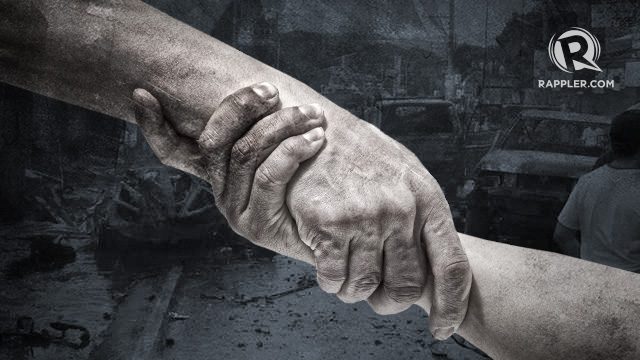SUMMARY
This is AI generated summarization, which may have errors. For context, always refer to the full article.

MANILA, Philippines—When terrorists attack, local government officials are on the front line, and are responsible for seeking reinforcements from the national government. But what can they do until help arrives?
As mandated in the Local Government Code, local chief executives – barangay captains, mayors, and governors – can use their power “over all programs, projects, services, and activities” of the government to respond to any crisis.
Barangay officials
“The first defense is the barangay,” said Johnny Yu, director of the Manila Disaster and Risk Reduction and Management Council (DRRMC). Aside from dealing with natural disasters, city DRRMCs also prepare for human-induced disasters, which include terrorism.
The Philippine National Disaster Response Plan (NDRP) against terrorism says that before conflicts erupt, barangays should already have evacuation plans outlining evacuation sites and essentials that they should bring in escape.
Yu added that barangay officials also have an emergency communication plan that ensures instructions reach everyone. According to him, radio communication is effective in rural areas, and a “multimedia” approach including television and social media suits urban areas.
When terror strikes, barangay officials need to execute these plans and account for all their residents in their designated evacuation areas, making sure that they have access to food, water, and communication lines.
“They know the people in their area which is why they, themselves, should do the training for their people, they, themselves should know this,” said Yu.
According to the NDRP, barangay officials, being the closest to ground zero, should also continuously provide information of the crisis for the mayor and responding security forces to assess. (READ: ‘It takes a village to sustain safety and security’)
Mayors
Yu said mayors have the most difficult task of being the direct connection of the city or town to the national government and at the same time, overseeing its residents.
“The job of the mayor now is to monitor, coordinate with local departments, and advise local police to hold ground, [and] to defend the city whatever happens,” Yu said. “[The mayor] has to assure the people that the city will not fall to the wrong people, it will not fall to people who spread terror.”
According to the NDRP, mayors can do this by ordering the police and the reserve forces of the Armed Forces of the Philippines to respond. (READ: Soldiers help QC cops as NCR police on ‘full alert’)
To prevent fires and jailbreaks, mayors can coordinate with the Bureau of Fire Protection and the Bureau of Jail Management and Penology.
For relief efforts, mayors can command local counterparts of national agencies such as the Department of Social Welfare and Development and the Department of Health.
They will also oversee city-wide evacuations continuing the plans of barangay officials and managing space and resources for all its residents.
While help is on the way, Yu said that mayors should be truthful in reporting to the President and the public of the situation of their areas. (READ: Marawi mayor to gov’t: Uphold human rights of ‘innocent civilians’)
Mayors cannot exaggerate the situation because it leads to panic, at the same time, mayors cannot say that “everything is business as usual” if “nagpuputukan doon” (people are already exchanging gunfire).
Governors
According to Yu, the mayor directly contacts the national government when terrorists strike, but the governors are still part of the coordination in order to oversee the response of the province attacked.
The task of the governor, Yu said, is to “isolate” the terrorized city or municipality, preventing the crisis from bleeding to other areas.
The governor does this by initiating lockdowns and setting up checkpoints with the coordination of the other mayors and heads of regional bases of the police and army.
In case of evacuations of entire cities or municipalities, governors appeal to the mayors of unaffected cities and municipalities to open evacuation centers and pool in donations until the crisis is contained. (READ: Thousands flee Marawi to escape clashes)
Yu clarified that donations are first collected and distributed by the government only because non-government volunteers are civilians too. “If anything happens to them, it will be a problem of the government,” he said.
When help arrives
Asked about what local chief executives can do to better handle the crisis with the national government, Yu said that “smooth and constant communication” is most important.
He said that information needs to travel from the ground to the president and from the president to the ground efficiently and truthfully.
“If there are no [telecommunications companies] working, all [government] units should have satellite phones, because these are the only devices that work,” Yu said. “there are [also] certain communication gadgets that the government can purchase to control entire social media [and prevent fake news].”
Yu then urged citizens to prepare for terror strikes by remembering where to evacuate and which items to bring or leave behind.
He also said that it is especially in times of severe crisis that citizens should trust and cooperate with the government. (READ: Who’s afraid of martial law… in Mindanao?)
“Whether you declare martial law, whether you don’t declare martial law, the important thing is that the people should always be prepared,” Yu said. – Rappler.com
Add a comment
How does this make you feel?
There are no comments yet. Add your comment to start the conversation.